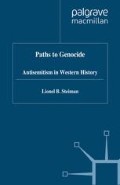Abstract
The roots of the Enlightenment lay in the new mathematics, astronomy, and physics advanced by Kepler, Galileo, and Newton; the heliocentric universe posited earlier by Nicholas Copernicus; and the inductive method of scientific investigation developed earlier still by Sir Francis Bacon. Galileo conclusively demonstrated the heliocentric cosmology, and Newton discovered the physical laws that governed the universe. Their astronomy and physics remained uncontested until the twentieth century. The motto of René Descartes — ‘I think, therefore I am’ (cogito ergo sum) — together with Isaac Newton’s law of gravity, came to epitomize the daring rationalism and universalist certainties of the Scientific Revolution. As this epoch dawned into the Enlightenment, Alexander Pope epitomized the evolving sequence in verse:
Nature and Nature’s Law’s lay hid in night: God said, Let Newton be! and all was light.
Access this chapter
Tax calculation will be finalised at checkout
Purchases are for personal use only
Preview
Unable to display preview. Download preview PDF.
Notes
Léon Poliakov, The History of Anti-Semitism. Volume III, From Voltaire to Wagner (London: Routledge & Kegan Paul, 1975), 109; 121.
Paul R. Mendes-Flohr and Jehuda Reinharz, eds, The Jew in the Modern World. A Documentary History ( New York and Oxford: Oxford University Press, 1980 ), 10.
Léon Poliakov, The History of Anti-Semitism, Volume I, From Roman Times to the Court Jews ( London: Routledge & Kegan Paul, 1974 ), 97.
Salo W. Baron, ‘Newer Approaches to Jewish Emancipation,’ Diogenes, (Spring 1960), 65.
Paul Lawrence Rose, Revolutionary Antisemitism in Germany from Kant to Wagner ( Princeton: Princeton University Press, 1990 ), 80.
Mendes-Flohr and Reinharz, eds, op. cit. 27–34; David Sorkin, The Transformation of German Jewry, 1780–1840 (New York and Oxford: Oxford University Press, 1987), 23 ff.
Vicki Caron, Between France and Germany. The Jews of Alsace-Lorraine, 1871–1918 (Stanford: Stanford University Press, 1988), 2 ff.; Barnet Litvinoff, The Burning Bush 120 ff.
But cf. Paul Breines, Tough Jews. Political Fantasies and the Moral Dilemma of American Jewry, New York: Basic Books, 1990.
Arthur Hertzberg, The French Enlightenment and the Jews (Philadelphia: Jewish Publication Society of America, 1968), 4, 7.
Arnold Ages, ‘Voltaire. That Intolerant Apostle of Tolerance’, Midstream (January 1995), 10 f.
Fritz Stern, ed., The Varieties of History. From Voltaire to the Present (New York: Vintage Books, 1973), 14, 35 ff
Karl LSwith, Meaning in History (Chicago: Phoenix Books, 1964), Chapter V, ‘Voltaire’; and Katz, op. cit. 34–47.
See John Gross, Shylock. A Legend and Its Legacy, New York: Simon & Schuster, 1992
Bryan Cheyette, Constructions of ‘the Jew’ in English Literature and Society, Cambridge: Cambridge Univesity Press, 1993.
Paula Hyman, The Emancipation of the Jews of Alsace: Acculturation and Tradition in the Nineteenth Century, New Haven, Conn.: Yale University Press, 1991.
Franz Kobler, Napoleon and the Jews (New York: Schocken Books, 1976), 213 f.; Litvinoff, op. cit., 136; Poliakov, op. cit., Volume III, 249.
William Wordsworth, as quoted in Kenneth Clark, Civilisation ( London: BBC and John Murray, 1971 ), 296.
Author information
Authors and Affiliations
Copyright information
© 1998 Lionel B. Steiman
About this chapter
Cite this chapter
Steiman, L.B. (1998). The Eighteenth Century: Enlightenment, Revolution, Emancipation. In: Paths to Genocide. Palgrave Macmillan, London. https://doi.org/10.1057/9780230371330_5
Download citation
DOI: https://doi.org/10.1057/9780230371330_5
Publisher Name: Palgrave Macmillan, London
Print ISBN: 978-1-349-40362-2
Online ISBN: 978-0-230-37133-0
eBook Packages: Palgrave History CollectionHistory (R0)

